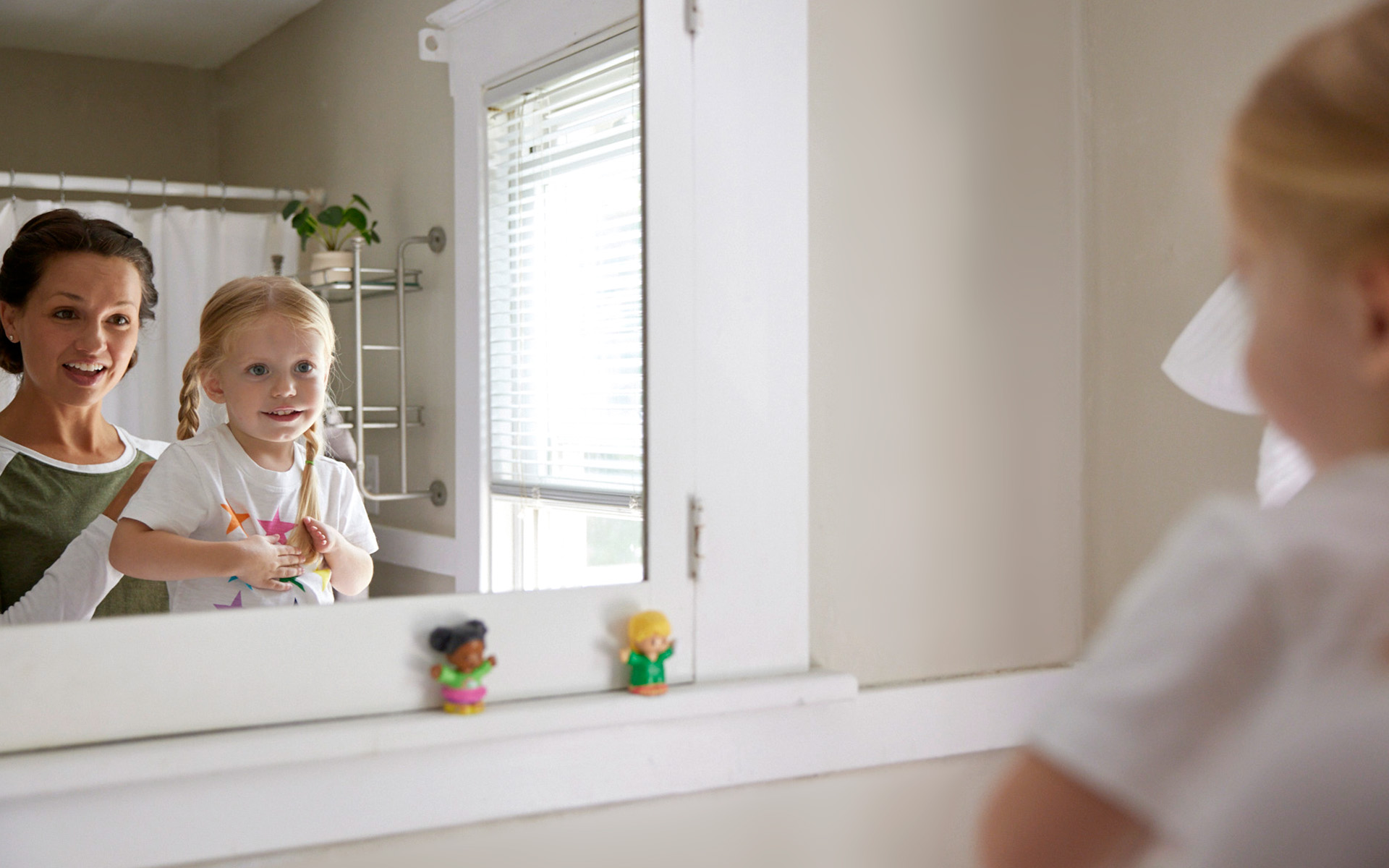Daily Affirmations That Help Promote Positive Thinking

Daily Affirmations
You might be seeing articles or socials posts about daily affirmations and wondering why they’ve become so popular. It’s because research studies have found that positive affirmations have been shown to lower the levels of the stress hormone cortisol, helps build a positive self-image, and increases resiliency.5,6
Daily affirmations can develop your little one’s sense of who they are and what they value – setting a foundation for self-love that will stick with them their entire lives.4,8 That self-love is also an important first step in teaching your kiddo to love and accept others.
Helpful tip: Affirmations have also been shown to provide the same benefits when a child is nonverbal (infants or kids with disabilities), so parents can say them to their child and build that same foundation.
So, what exactly are affirmations?
Simply put, affirmations are short phrases you can repeat to yourself to change or support the way you think and feel about yourself.
They can help you shift focus away from negative self-talk and recenter yourself onto your values and goals.
First things first –the basics
Affirmations are always positive.
Affirmations are in the present tense.
Affirmations (one or more) can be added to any part of your daily routine (ex. Getting out of bed, leaving for school/daycare or before going to bed at night)
Why daily?
The theory behind affirmations is that repeating positive statements about yourself will instill those words as learned facts. The repetition is important because it allows a child to form an understanding of the world around them, fostering learning and memory.1,2,3
We also know that when babies experience something new, their brain cells make neural connections called synapses. As these synapses are stimulated over and over again, they become hardwired.7
Simple Affirmations to get Started:
You are (I am) smart.
You are (I am) special.
You are (I am) beautiful.
You are (I am) brave.
You are (I am) kind.

Add a twist!
Say them in the mirror – allowing kiddos to see themselves while they say positive things about how amazing they are instilling self-confidence and pride.
Affirmations can be silly – For example: I am a dinosaur genius! I love my springy curls!
Dance it out! – Adding movement to your daily affirmations helps to keep it light and fun.
Sing it – If you can, let it rhyme and sing it out during your routines. Example: I am special, I am kind, I have a beautiful mind.
Personalize it
Try asking your little one what it is that makes them special and make it an affirmation.
Example: Your kiddo knows about every type of whale in the ocean. Adding – I am curious! to their affirmations would be a great compliment to their knowledge.
Is your little one having a tough day? Or are they transitioning into a new situation and feeling stressed about it? Remind them of their affirmations and say them together.
Start young. You might not expect it, but infants can internalize what they’re hearing and you can begin the practice of self-love before they can even talk.
Once your child is a little older and more independent, revisit their affirmations together. Maybe their affirmations can be more specific to a goal or a new value. Writing these affirmations and posting them in areas where they can read them each day is also a great practice for older children.
Citations:
1 Hintzman, D. L. (1976). Repetition and memory. In Psychology of learning and motivation (Vol. 10, pp. 47-91). Academic Press.
2 Horst JS, Parsons KL, Bryan NM. Get the story straight: contextual repetition promotes word learning from storybooks. Front Psychol. 2011;0.
3 Karpicke, J. D., & Roediger, H. L. (2008). The critical importance of retrieval for learning. Science, 319(5865), 966-968.
4 Cascio CN, O'Donnell MB, Tinney FJ, Lieberman MD, Taylor SE, Strecher VJ, Falk EB. Self-affirmation activates brain systems associated with self-related processing and reward and is reinforced by future orientation. Soc Cogn Affect Neurosci. 2016 Apr;11(4):621-9.
5 Cohen, G. L., & Sherman, D. K. (2014). The Psychology of Change: Self-Affirmation and Social Psychological Intervention. Annual Review of Psychology, 65, 333-371.
6 Creswell JD, Dutcher JM, Klein WM, Harris PR, Levine JM. Self-affirmation improves problem-solving under stress. PLoS One. 2013 May 1;8(5):e62593.
7 Falk EB, O'Donnell MB, Cascio CN, Tinney F, Kang Y, Lieberman MD, Taylor SE, An L, Resnicow K, Strecher VJ. Self-affirmation alters the brain's response to health messages and subsequent behavior change. Proc Natl Acad Sci U S A. 2015 Feb 17;112(7):1977-82.
8 Logel, C., & Cohen, G. L. (2012). The role of the self in physical health: Testing the effect of a values-affirmation intervention on weight loss. Psychological Science, 23(1), 53-55.
9 Steele, Claude M. 1988. The Psychology of Self-Affirmation: Sustaining the Integrity of the Self. In Advances in Experimental Social Psychology, Vol. 21, ed. Leonard Berkowitz, 261–302. San Diego, CA: Academic Press.

















